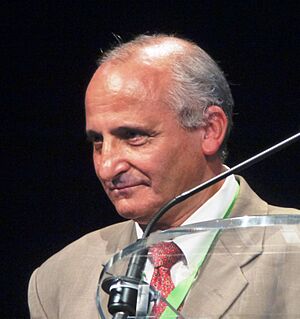Rachid Yazami facts for kids
Rachid Yazami (Arabic: رشيد اليزمي ; born in 1953) is a brilliant Moroccan scientist, engineer, and inventor. He is famous for his important work on lithium-ion batteries, which power many of our devices today. He helped create the special part of these batteries called the graphite anode, which is like the negative side. He also researches new types of batteries called fluoride ion batteries.
Contents
Learning and Early Career
Rachid Yazami studied at the Grenoble Institute of Technology and finished his studies in 1978. He then earned his PhD degree in 1985. After that, he joined the French National Centre for Scientific Research (CNRS) in France. He became a research director and professor there in 1998.
Making Batteries Better
The Big Discovery
In 1980, Dr. Yazami made a huge discovery. He was the first scientist to show that lithium could be safely stored inside graphite using a special material called a polymer electrolyte. This was a very important step! His discovery led to the graphite anode that is now used in almost all commercial lithium-ion batteries. These batteries are found in your smartphones, laptops, and even electric cars. The market for these batteries is now worth over $80 billion!
Working with New Materials
Dr. Yazami also explored other graphite materials for batteries. These included graphite oxide and graphite fluoride. In 2007, he started his own company in California. This company aimed to develop and sell his inventions, especially those related to fluoride ion batteries.
Research in the United States and Singapore
While working for CNRS in France, Dr. Yazami also spent time at the California Institute of Technology (Caltech) from 2000 to 2010. There, he studied tiny materials called nanostructures, like carbon nanotubes, which can make batteries better. He also looked at how materials change inside batteries.
In 2010, Dr. Yazami moved to Singapore. He became a professor at the Nanyang Technological University (NTU). He led battery programs and worked on electric car research. While in Singapore, he wrote over 200 scientific papers. He also has nearly 180 patents for his inventions!
Making Batteries Safer and Faster
Dr. Yazami developed a new way to check a battery's health and safety. It uses something called "thermodynamics measurements" (ETM). This method helps batteries last longer and be safer. He even came up with a rule called "Yazami's Battery Theorem." This theorem helps understand how a battery's charge relates to its energy and heat.
He also found a way to detect tiny problems inside a battery very early. These problems, called "internal short circuits," can cause batteries to overheat or even catch fire. His method helps prevent these dangerous situations, making batteries much safer.
More recently, Dr. Yazami invented a super-fast way to charge lithium-ion batteries. This method, called "Non-linear voltammetry" (NLV), can charge batteries in 10 minutes or less! This is a big deal for electric cars, as it means you could charge them almost as fast as filling a gas tank.
Awards and Recognition
Dr. Yazami has written over 250 published papers. He also holds about 160 patents related to batteries. He has received many awards for his amazing work.
- In 2012, he won the Institute of Electrical and Electronics Engineers IEEE Medal for Environmental and Safety Technologies.
- In 2014, Dr. Yazami, along with John Goodenough, Yoshio Nishi, and Akira Yoshino, received the prestigious Draper Prize. This award recognized their pioneering work that laid the foundation for today’s lithium-ion battery. The prize included a $500,000 award.
- That same year, he was honored by the King of Morocco, Mohamed VI, with the Royal Medal (Wissam Malaki) of Intellectual Competency. He was also appointed a member of the Hassan II Academy of Sciences and Technologies.
- In 2016, he received the title of Chevalier de la Legion of honor from France.
- He has also won the Takreem Award for Science and Technological Achievement (2018) and the Mohammed bin Rashid Medal for Scientific Excellence (2020).
- In December 2023, Dr. Yazami was awarded the VinFuture Grand Prize in Vietnam, along with M. Stanley Whittingham, Martin Green, and Akira Yoshino.
Nobel Prize Discussion
In October 2019, the 2019 Nobel Prize in Chemistry was given for the invention of the lithium-ion battery. The award went to Stanley Whittingham, John Goodenough, and Akira Yoshino. While Dr. Yazami's crucial work on the graphite anode was a key part of the battery's success, he was not included in the award. The Nobel Prize can only be given to up to three people. Dr. Yazami believes the committee had a tough choice. Even so, he congratulated the winners.
 | Precious Adams |
 | Lauren Anderson |
 | Janet Collins |


